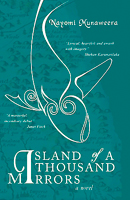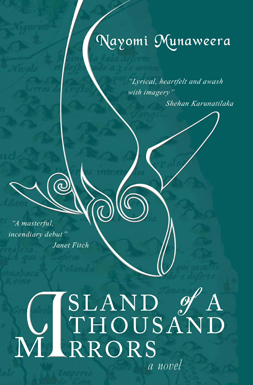A powerful reflection
Nayomi Munaweera’s Island of A Thousand Mirrors flashes at many levels of intensity both in the tropical sunshine of her home country and the colder continent in which she later resides. In a series of finely drawn cameos she projects some memorable life – experiences of mainly two Sri Lankan families caught in the changes which characterise the turbulent world we inhabit today. At one level it is the late 20th century story of displacement and alienation.

Nayomi: Scorching debut
At another, the wrenching dislocation of people attempting to make sense of life and love in new and unfamiliar surroundings and relationships. Looming behind all hangs the ominous cloud of a brutal and ceaseless war which is never far away. The nostalgic memories of past times, carefree and certain, lived on the beaches of Hikkaduwa and Wellawatte or the banks of a lagoon in Mullaitivu add to the sense of impending disaster and loss.
There are two female narrators – one Sinhala, the other Tamil (which introduces an authenticity to the grim incidents they describe which one rarely finds in similar novels with a wartime background). Yasodhara who swiftly, ‘learning the lesson of her inadequacies’, acculturates to life in suburban America on leaving Sri Lanka in haste after a ghastly murder of a family member in 1983, and Saraswathie in the Vanni who painfully and reluctantly leaves her home to join the rebel Movement as an option to jumping in the well having been rendered a ‘spoilt’ and unclean girl. .
The horrors of war Munawe-era’s fictional characters encounter while growing up are drawn in a fine balance to each other. The chilling episode of gang rape that the abducted Saraswathie, suspected of being a female Tiger endures, is paralleled by the ferocious hatred which drives the Tiger squadron raiding a border village to disembowel its sleeping children. The fiction is sadly made real for us by what our audiences have seen and heard during the war and after.
But it is not only in fierce descriptions of blood and the spilling of guts that this gifted writer uses her extraordinary power with words. Yasodhara’s passionate encounters with her childhood Shiva, transcending the socially sanctioned boundaries, are portrayed with a rare touch of felicity and elegance. Her words are limpid and deep in imagery wherever she looks;
‘The schoolroom sits under the banyan tree, full of children like a tree heavy with raucous birds’.
She writes of the village school that Saraswathie attends in the war zone. There is irony and fun in those moments of parental ecstasy when the Great Husband Hunt starts for Yasodhara in North America. Permeating her writing always one senses a deep love of country and people, sadness at its pain and hope in the future when the war is over.
The action is swift and compelling throughout. Scene changes are fast. From California fast forward to the Vanni and back. Perhaps the scene shifts are too rapid that the not – too – careful reader may be left behind. But that is a minor distraction.
The attention to detail and context in the telling of the stories is such that most of the time the reader is inclined to forget that this is fiction. One wonders at moments like this of the depth of research that underlies the writer’s fictional enterprise. To the policy makers some of the book’s insights could well help in the current task of reconciling the ethnic differences that yet challenge us.

Mirrors ends with the shattering impact that its earlier reflections prepare us for. The once physically distant heroines of the story are brought together by chance in a bloody explosion on the streets of Colombo. But the suicide bomb that engulfs both was not meant for the other. Like many of the individuals in the story they just happen to be in the wrong place at the wrong time.
Readers mostly are conservative people and especially for those reared on the journalistic, mostly ideological, accounts of ‘Our War’ between the forces of good and those of evil, it is unsettling to face the truths that fiction can sometimes provide. The War as most of us who lived through it these 30 years know, changed us and everything around us. Nayomi Munaweera’s many –layered, illuminating first novel provokes us to reflect on the myriad ways Our War has affected us and will continue to do so as we look at ourselves and today’s world.
Island of a Thousand Mirrors is available at Rs 1000 at all leading bookshops
Follow @timesonlinelk
comments powered by Disqus























